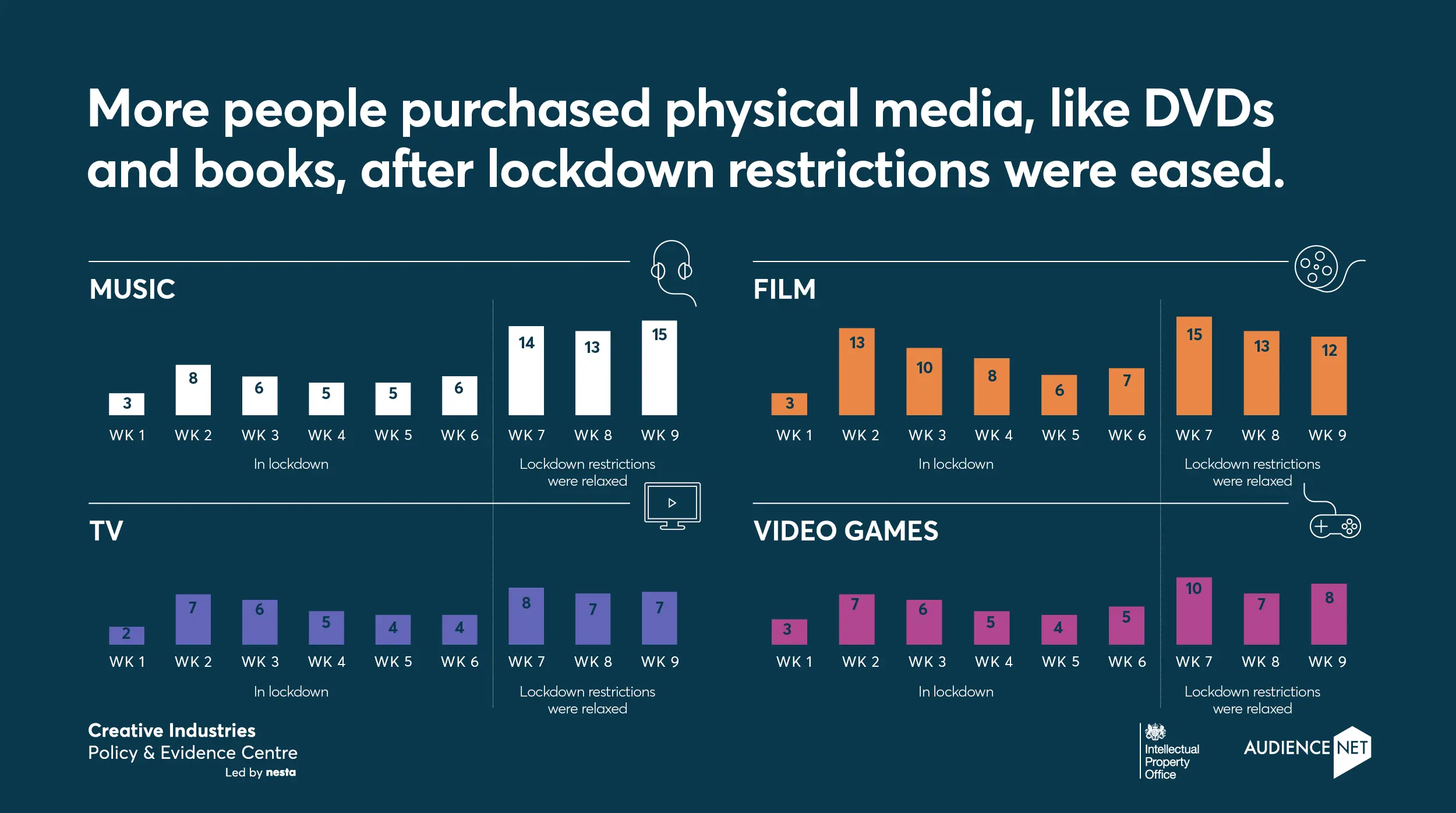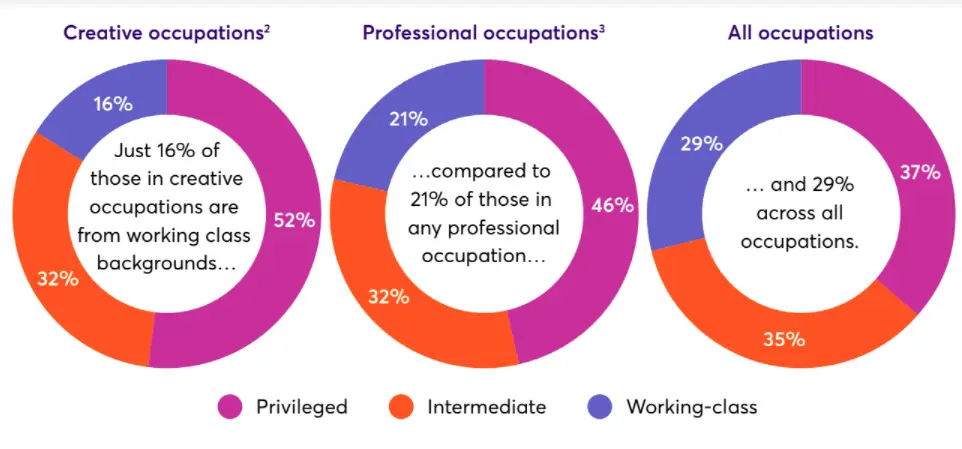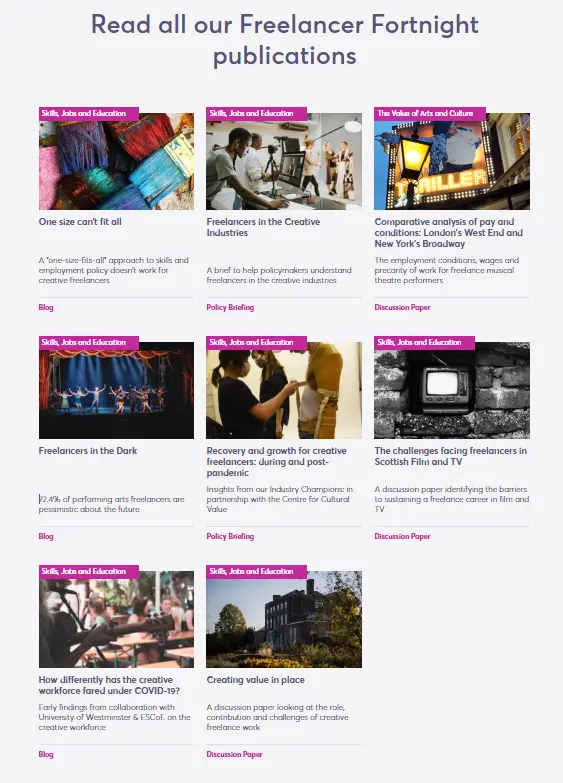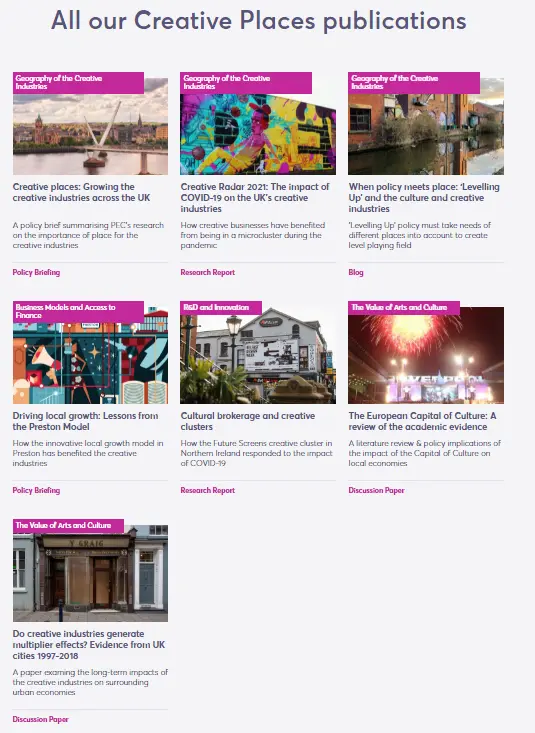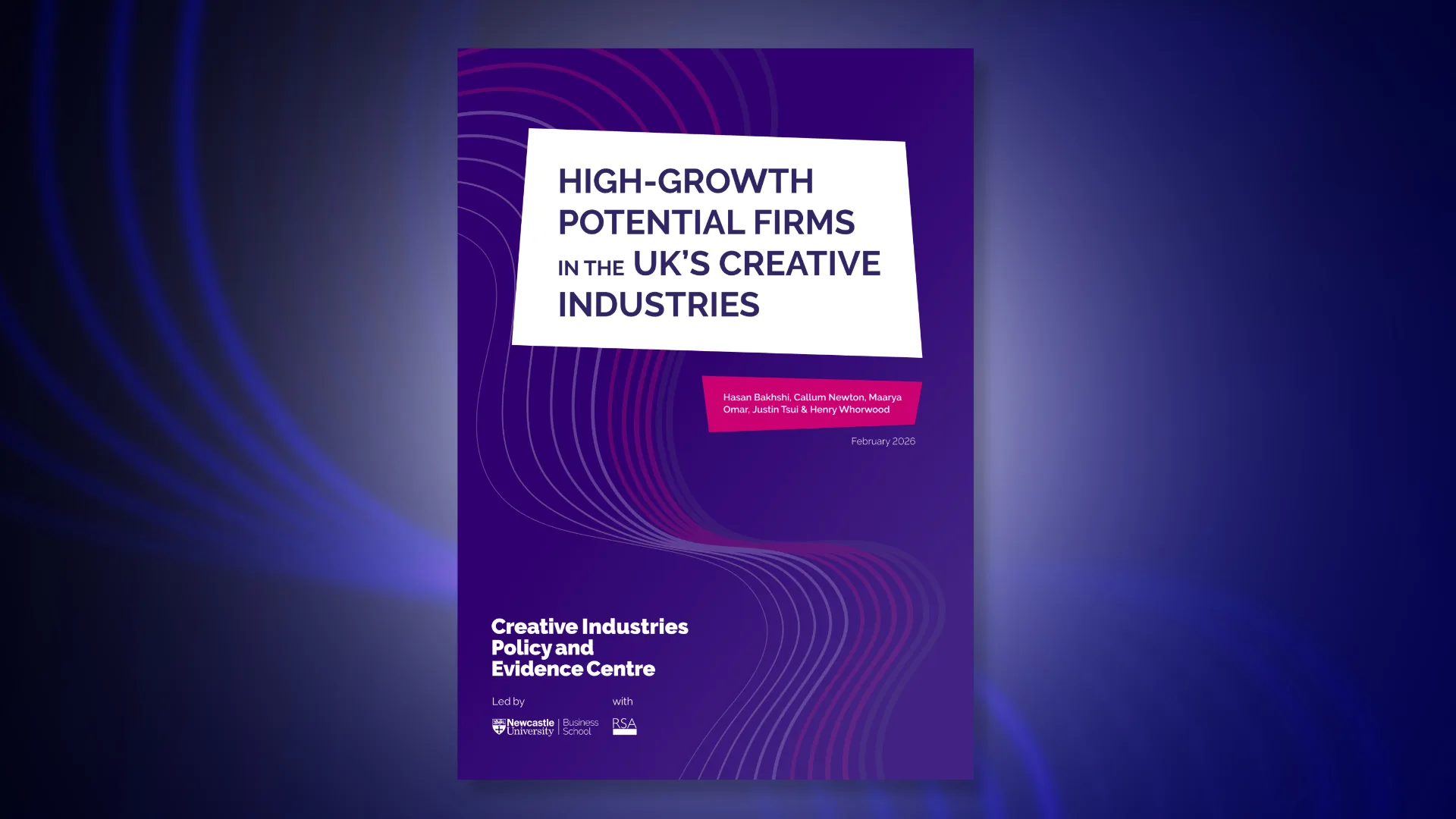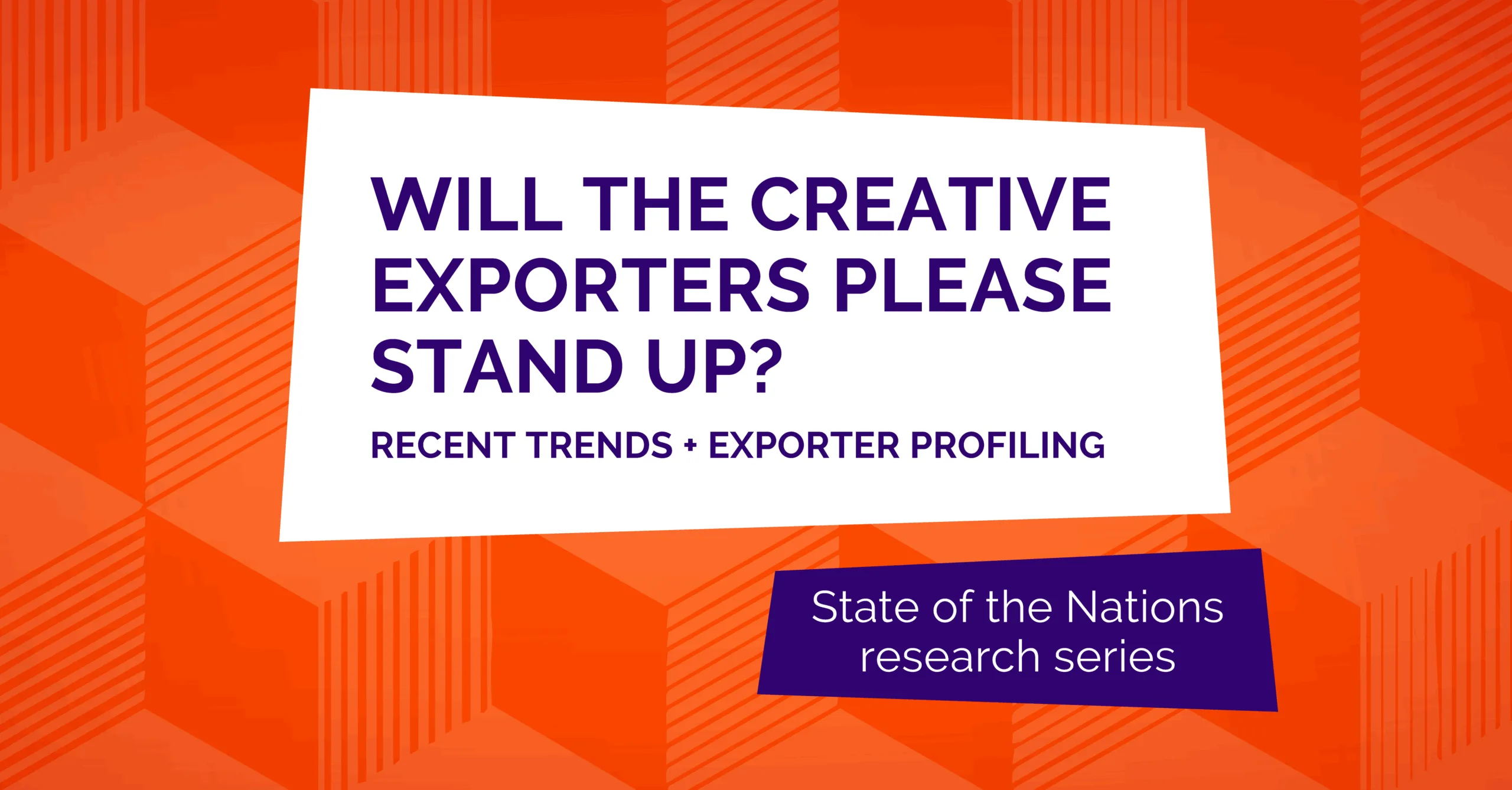A look at PEC’s work over the last year to see how we have responded to the COVID-19 crisis
Throughout the pandemic and lockdowns, the Creative Industries Policy and Evidence Centre has acted as a hub for gathering vital COVID-19 related information for people working in the creative industries.
The PEC’s researchers have supported and advised government policy makers, responding to significant government announcements such as budgets and white papers. Among other things, the PEC’s research has highlighted the damage done to the creative industries during the course of the pandemic, including the loss of jobs, the disproportionate impact on Black, asian and ethnically diverse (BAED) people, young people, and women, and the danger of return to rising concentration of creative organisations in London and the South East.
A rapid response
The PEC responded quickly to the emerging crisis, publishing our first COVID-19 related content at the end of March, just days after the first lockdown was announced. This report, Charities Speak, written in collaboration with Nesta, explored the potential impact of COVID-19 on arts and cultural charities, using data science techniques to advocate for the value of arts and culture, and the need for the government to provide charities with support during the pandemic.
This piece was followed up by a blog on the importance of the arts for people during lockdown. The blog made it clear how important creative and cultural content – from TV series, to books and crafts – are for people who are stuck indoors, especially vulnerable people who are isolated from their friends and family. At this early stage in the pandemic, we highlighted the danger that lockdown and the pandemic could pose to the creative industries, even more so than other sectors of the economy.
Since then, we have published 20 reports and discussion papers, plus blogs and policy briefings, that focus directly on COVID-19, and many others that include comments on the pandemic.
The PEC has drawn attention to the impact on the creative industries throughout the pandemic. Through resource pages, such as a blog for creative businesses offering ten tips for how to design a COVID-19 sector survey, we have provided information and advice for people working in the creative industries.
Our most visited page on our website over the last year has been this frequently updated list of all open and closed surveys. It provides a central hub for people working in the creative industries to share their experiences, and to access vital information on the creative industries, as well as signposting policymakers to all sorts of surveys and data sources about the impact of the pandemic on the sector.
Measuring different impacts of the pandemic on the sector
As well as sharing information with the sector, we moved quickly to commission our own study to measure the impact of COVID-19, in partnership with the Intellectual Property Office (IPO) and research agency, AudienceNet. This study followed a cohort of 1,000 consumers over a six-week period, to measure how their habits of cultural consumption had changed over the pandemic and subsequent lockdowns, and if it had an impact on people’s wellbeing. All of the content categories across music, film, TV, video games and e-books were found to play an important role in helping people deal with difficult circumstances during the pandemic.
After the initial six week period, between April and May 2020, the study was, thanks to additional funding from the IPO and UKRI, extended for a further three weeks, covering July, August and September 2020.
The final nine week study found that existing long term trends in creative content consumption, such as the decline of downloading content in favour of streaming, had been accelerated during lockdown.
Further PEC research, such as the On-Demand Culture report published in January 2021, has corroborated these findings, and added to the evidence base, with a more detailed breakdown of the impact of the pandemic on games and streaming services.
A graphic from the AudienceNet study showing changes in consumer behavior of over the course of the nine week study from April to September 2020
On 16 June, a day after face masks became compulsory on public transport in England, we published ‘The importance of a UK-wide recovery plan for the creative industries’. This policy briefing set out a range of recommendations for how the post-pandemic recovery can be spread evenly around the UK. It suggested how policy makers can build a fair economic recovery that avoids a regional concentration of the creative industries, as happened after the 2008 financial crisis.
Following that report, we published a guest blog by Andy Pratt, Professor of Cultural Economy, City University of London, setting out what the government needs to do to support the creative industries through the lockdown. We also consulted with our panel of Industry Champions about their experience of business model disruption and innovation within their own organisations during the pandemic.
Throughout July, we published content that focussed on the creative industries outside of the UK. In a three-part series, we published the perspectives of people working in different parts of the sector from Brazil, from Kenya, and from the US, all of whom are part of the PEC’s International Council. These blogs provided new insights into how other countries are coping with the pandemic, how people are using creativity and cultural content to keep themselves going through lockdowns, and the specific policy solutions that different countries are implementing.
Focussing on those most affected by COVID-19
By the start Autumn 2020, as the UK began to record a resurgence in infection rates, and the government announced a new set of social distancing and quarantine restrictions, the PEC’s research began to focus on specific areas of the economy, and sections of society, that are being particularly affected by the pandemic. One of the most widely read PEC publications in 2020 was the report and accompanying blog on rebuilding a more inclusive creative economy after the pandemic, Getting in and getting on: Class, participation and job quality in the UK’s Creative Industries.
This research highlighted the ongoing challenges that people from working-class backgrounds face when trying to begin careers in the creative industries. In particular, it described how these challenges have to be understood through the prism intersectionality. This means that different social cateogories, such as ethnicity , gender or class, can create overlapping and interdependent systems of discrimination or disadvantage. For example, people with a physical disability, with low skills levels, and from working class and minority ethnic backgrounds, were more likely to experience multiple disadvantages, than those without these social characteristics.
Significantly, the research found that the chance that someone from a working-class background will find work in a creative occupation has remained largely unchanged since 2014. Meanwhile, men from privileged, middle-class, backgrounds are almost five times more likely to secure work in creative occupations than working-class women.
A graphic from PEC’s report on class and diversity in the creative industries
These findings were referenced by the Common’s DCMS Committee as part of its inquiry into the impact of COVID-19 on the creative industries. The research was also later referenced by Lord Ed Vaizey in House of Lords questions on Covid-19 and social mobility.
This report on class was followed by two further publications in December, on the scale of the job loss in the creative industries, and the impact on diversity in the sector. A Jobs Crisis in the Cultural and Creative Industries, from the COVID-19 research project led by the Centre for Cultural Value in collaboration with the PEC and The Audience Agency, found 55,000 job losses (a 30% decline) in music, performing and visual arts as a result of the pandemic.
A follow up piece from the project found that this has disproportionately affected young people and women, who are far more likely to have lost their jobs compared to their older, male counterparts.
In partnership with the All-Party Parliamentary Group (APPG) for Creative Diversity, we consulted with the PEC’s Industry Champions to better understand the impact of COVID-19 on workforce diversity in the creative industries. The panel provided a range of valuable insights and recommendations, for example, that creative industry organisations should pay the Living Wage to interns, and that in the post-pandemic landscape, employers should consider employing people from non-traditional backgrounds.
Recovering fairly from the pandemic
As the UK began to slowly emerge from lockdown, and restrictions were eased, the creative industries had a chance to recover. As our research has repeatedly shown, in order to ensure that any recovery is evenly spread across the country, and fairly among all demographic groups, the government will need to implement a range of policy measures. We have published two significant responses to government announcements at the start of 2021 suggesting how to do this.
In response to the March Budget we called for the creative industries to be included in the government’s definition of R&D, for a reform of the UK’s migration systems including the introduction of a freelance visa, and for the use of fiscal tools such as the The Recovery Loan Scheme, the Shared Prosperity Fund and Levelling-Up Fund to make sure that the post-pandemic recovery is more evenly felt across the UK’s regions.
In response to the Integrated Review, we recommended that the Foreign Office should introduce a range of measures to help the diplomatic service work more effectively with the UK’s creative industries, enhancing the UK’s already significant soft power capabilities. We also repeated our calls for a reform of the migration system to encourage more foreign talent to move to the UK, and changes to the government’s definition of R&D.
Learning lessons from the policy responses to the pandemic
At the start of May 2021 we ran the PEC’s first communications campaign, ‘Freelancer Fortnight’ focussed on self employed and freelance workers in the creative industries. The campaign ran for two weeks, and each day we published new research, policy briefs, and discussion papers.
Freelancers make up a much higher proportion of the total workforce for the creative industries compared to other economic sectors, and the pandemic has exposed the precarity of employment in the creative industries. Government support, such as the furlough scheme, was largely designed to work for people employed by organisations on full time contracts, not self-employed or freelance workers. Many creative freelancers struggled to access the support they needed during the pandemic, and, as other PEC research has shown, there were widespread job losses, particularly in vulnerable sub-sectors such as performing arts.
Everything we published as part of the Freelancer Fortnight campaign
The research we published also pointed towards solutions to some of these challenges. For example, a briefing note from our panel of Industry Champions was full of suggestions for how to support freelancers in the short term, and for longer term policy changes. The policy challenges and proposals encapsulated in the research published during ‘Freelancer Fortnight’ were summarised and explained in a comprehensive PEC briefing note.
There were further opportunities to look back on the research the PEC has released when in June we published a page collecting all of the data and blogs published as part of the COVID-19 digital consumer survey tracker, in partnership with the Intellectual Property Office (IPO) and the research agency AudienceNet.
In July, following the success of Freelancer Fortnight, we launched a second communications campaign called ‘Creative Places’. The focus of this work was the role of geography and place in creative businesses, and in particular, looking at the findings from the Creative Radar research project.
Creative Places was designed to complement and parallel the government’s ‘Levelling Up’ strategy, and to present the PEC’s research on how the creative industries can generate economic value for the UK, create more jobs and stimulate local economic growth.
The flagship research was ‘Creative Radar 2021’, the follow up report to the first Creative Radar. This new research found that creative businesses managed to weather the pandemic by operating within a ‘creative cluster’. In fact, organisations in a creative cluster were just as likely to survive, whether they were in rural Wales or central London, compared to those which were not in a cluster.
Everything we published as part of the Creative Places campaign
We also published new research from Future Screens NI, that explained some of the strategies they employed to help the Screen Industry in Northern Ireland address the impacts of COVID-19. Many of the short term initiatives they launched as stop-gaps have been transformed into long term projects, and the research is full of useful lessons for creative sub-sectors around the UK.
In September, we published the PEC’s representation to the Government’s autumn Spending Review. The Spending Review is when the government scrutinises it’s spending policies and updates them for the foreseeable future. As part of this process, organisations like the PEC are encouraged to submit a representation to the Treasury outlining what we think should be the areas of policy the government should be focussing on.
The PEC’s representation covered three areas.
Firstly, we need an innovation-led recovery from the pandemic, meaning that the government should redesign tax credits in order to encourage creative businesses to invest in R&D.
Secondly, that any recovery must be UK-wide, rather than focussed on a few geographic areas like London and the South East. Well evidenced examples for how to do this, such as the Preston Model, should be used to design the Levelling Up Fund.
Thirdly, the pandemic exposed how precarious employment is in the Creative Industries, and that current employment and skills policies are not well designed for freelancers. The Government should consider appointing a Freelancer Commissioner to respond to these challenges.
We will continue to use our research to highlight the importance of the creative industries for the UK economy and society, and to propose evidence-based policy interventions to support the sector as it recovers from the pandemic.
(this blog was first published in April 2021 and updated October 2021)
Image credits: Hello I’m Nik (thumbnail image) and Chloe Evans (hero image) on Unsplash
Related News and Press
Creative Industries present huge investment opportunity
New research shows ‘high-growth potential firms’ outnumber both Life Sciences and Advanced Manufactu…
Bolster business and financial support for creative industries micro firms to achieve UK innovation and growth ambitions
New Creative PEC research suggests creative industries micro firms have a vital role to play in driv…
Back the creative industries to grow the economy, says new research showing creative firms are more likely to be innovators and exporters
New research finds a higher share of UK creative MSMEs are exporters compared with the rest of the e…

